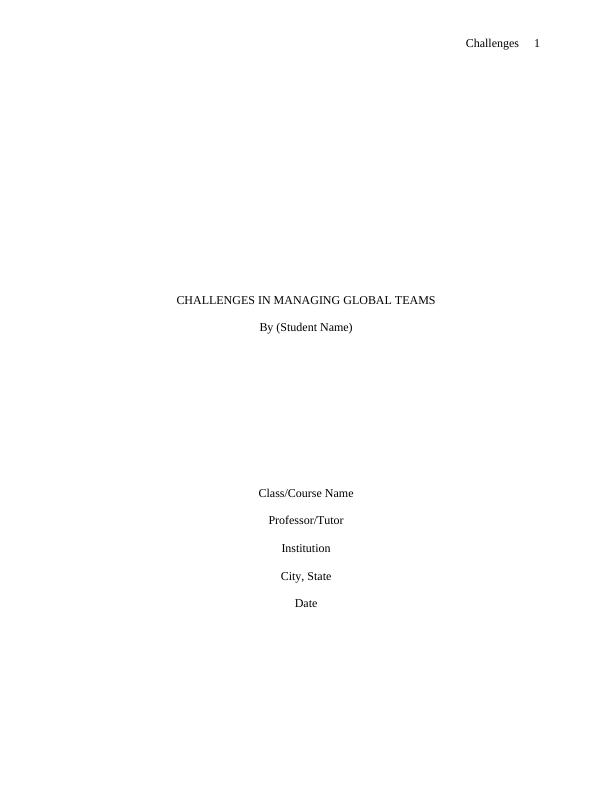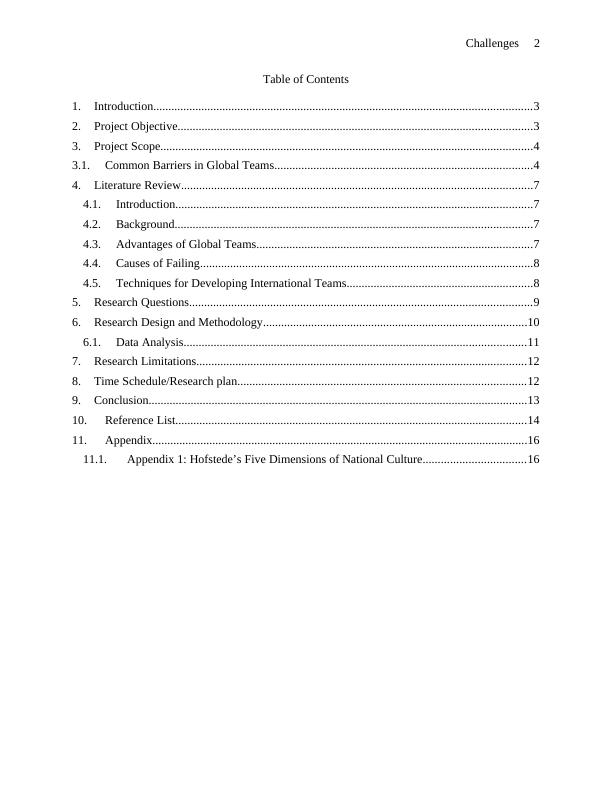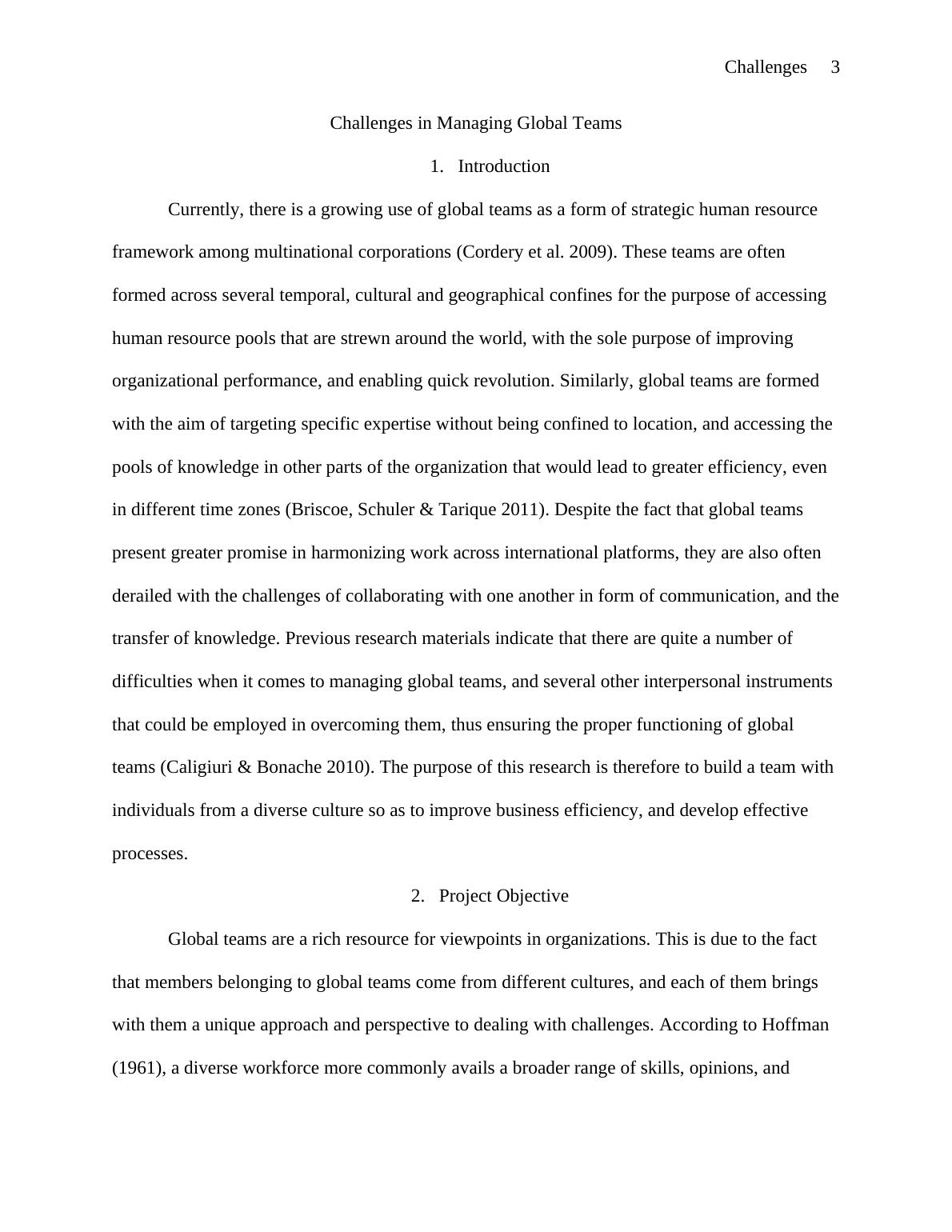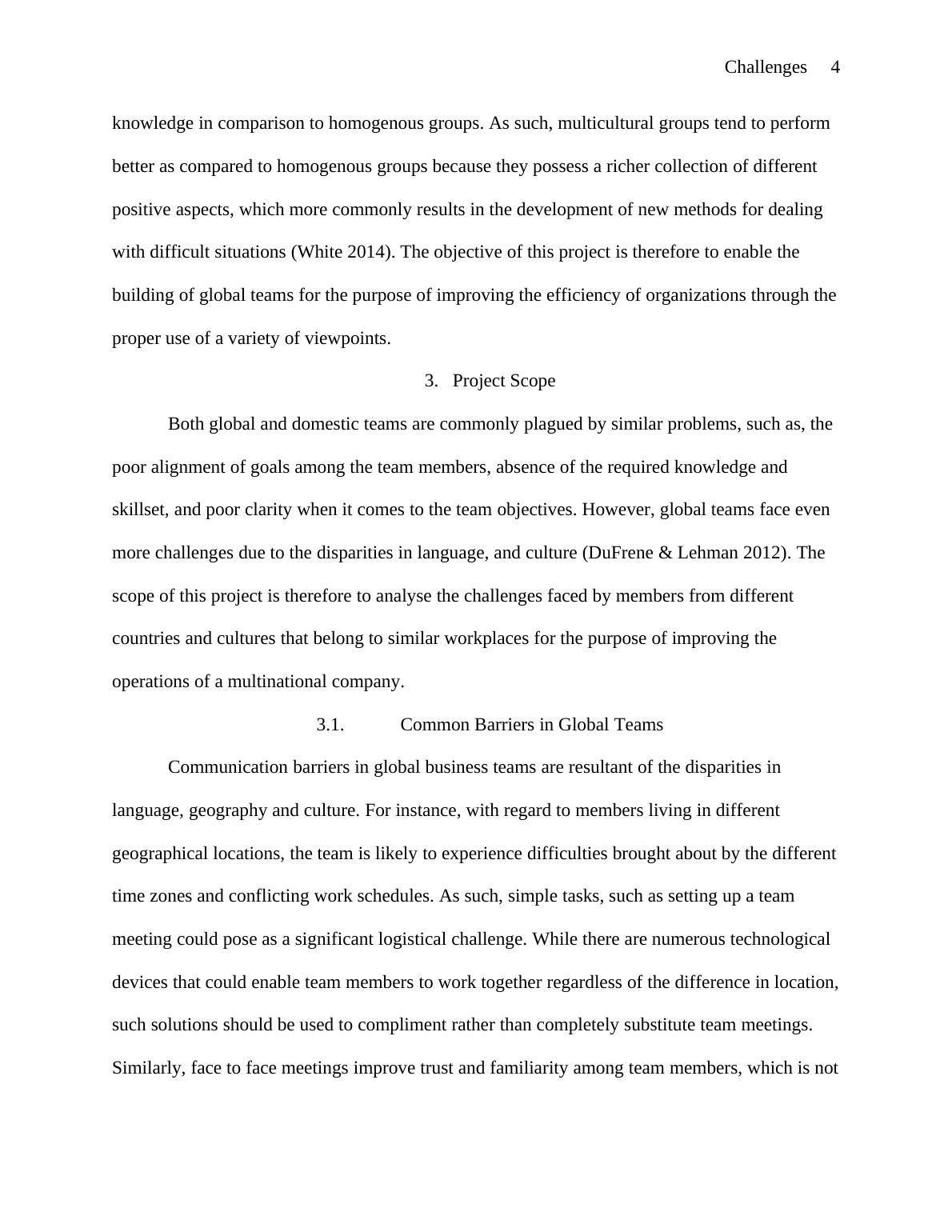(PDF) Challenges In Managing Virtual Teams
16 Pages3913 Words72 Views
Added on 2021-05-31
(PDF) Challenges In Managing Virtual Teams
Added on 2021-05-31
ShareRelated Documents
Challenges 1CHALLENGES IN MANAGING GLOBAL TEAMSBy (Student Name)Class/Course NameProfessor/TutorInstitutionCity, StateDate

Challenges 2Table of Contents1.Introduction..............................................................................................................................32.Project Objective......................................................................................................................33.Project Scope............................................................................................................................43.1.Common Barriers in Global Teams......................................................................................44.Literature Review.....................................................................................................................74.1.Introduction.......................................................................................................................74.2.Background.......................................................................................................................74.3.Advantages of Global Teams............................................................................................74.4.Causes of Failing...............................................................................................................84.5.Techniques for Developing International Teams..............................................................85.Research Questions..................................................................................................................96.Research Design and Methodology........................................................................................106.1.Data Analysis..................................................................................................................117.Research Limitations..............................................................................................................128.Time Schedule/Research plan................................................................................................129.Conclusion..............................................................................................................................1310.Reference List.....................................................................................................................1411.Appendix.............................................................................................................................1611.1.Appendix 1: Hofstede’s Five Dimensions of National Culture..................................16

Challenges 3Challenges in Managing Global Teams1.IntroductionCurrently, there is a growing use of global teams as a form of strategic human resource framework among multinational corporations[ CITATION Cor09 \l 1033 ]. These teams are often formed across several temporal, cultural and geographical confines for the purpose of accessing human resource pools that are strewn around the world, with the sole purpose of improving organizational performance, and enabling quick revolution. Similarly, global teams are formed with the aim of targeting specific expertise without being confined to location, and accessing the pools of knowledge in other parts of the organization that would lead to greater efficiency, even in different time zones[ CITATION Bri11 \l 1033 ]. Despite the fact that global teams present greater promise in harmonizing work across international platforms, they are also often derailed with thechallenges of collaborating with one another in form of communication, and the transfer of knowledge. Previous research materials indicate that there are quite a number of difficulties when it comes to managing global teams, and several other interpersonal instruments that could be employed in overcoming them, thus ensuring the proper functioning of global teams[ CITATIONCal10 \l 1033 ]. The purpose of this research is therefore to build a team with individuals from a diverse culture so as to improve business efficiency, and develop effective processes.2.Project ObjectiveGlobal teams are a rich resource for viewpoints in organizations. This is due to the fact that members belonging to global teams come from different cultures, and each of them brings with them a unique approach and perspective to dealing with challenges. According to Hoffman (1961), a diverse workforce more commonly avails a broader range of skills, opinions, and knowledge in comparison to homogenous groups. As such, multicultural groups tend to perform

Challenges 4better as compared to homogenous groups because they possess a richer collection of different positive aspects, which more commonly results in the development of new methods for dealing with difficult situations[CITATION Hof61 \l 1033 ]. The objective of this project is therefore to enable the building of global teams for the purpose of improving the efficiency of organizations through the proper use of a variety of viewpoints.3.Project ScopeBoth global and domestic teams are commonly plagued by similar problems, such as, the poor alignment of goals among the team members, absence of the required knowledge and skillset, and poor clarity when it comes to the team objectives. However, global teams face even more challenges due to the disparities in language, and culture[CITATION Gib06 \l 1033 ]. The scope of this project is therefore to analyse the challenges faced by members from different countries and cultures that belong to similar workplaces for the purpose of improving the operations of a multinational company.3.1.Common Barriers in Global TeamsCommunication barriers in global business teams are resultant of the disparities in language, geography and culture. For instance, with regard to members living in different geographical locations, the team is likely to experience difficulties brought about by the differenttime zones and conflicting work schedules. As such, simple tasks, such as setting up a team meeting could pose as a significant logistical challenge. While there are numerous technological devices that could enable team members to work together regardless of the difference in location,such solutions should be used to compliment rather than completely substitute team meetings. Similarly, face to face meetings improve trust and familiarity among team members, which is notoften evident in the more virtual meetings. For example, failure to witness other members’ body

End of preview
Want to access all the pages? Upload your documents or become a member.
Related Documents
Challenges Managing Global Teamslg...
|14
|3229
|192
Business Research Assignmentlg...
|12
|3014
|37
HI6008 - Business Research | Challenges Managing Global Teamslg...
|13
|2935
|47
Business Research - ways of managing the global teams in a smooth mannerlg...
|13
|2143
|515
Business Research Methodology (PDF)lg...
|17
|3851
|42
Managing Cultural Diversity in Workplacelg...
|23
|3945
|2
